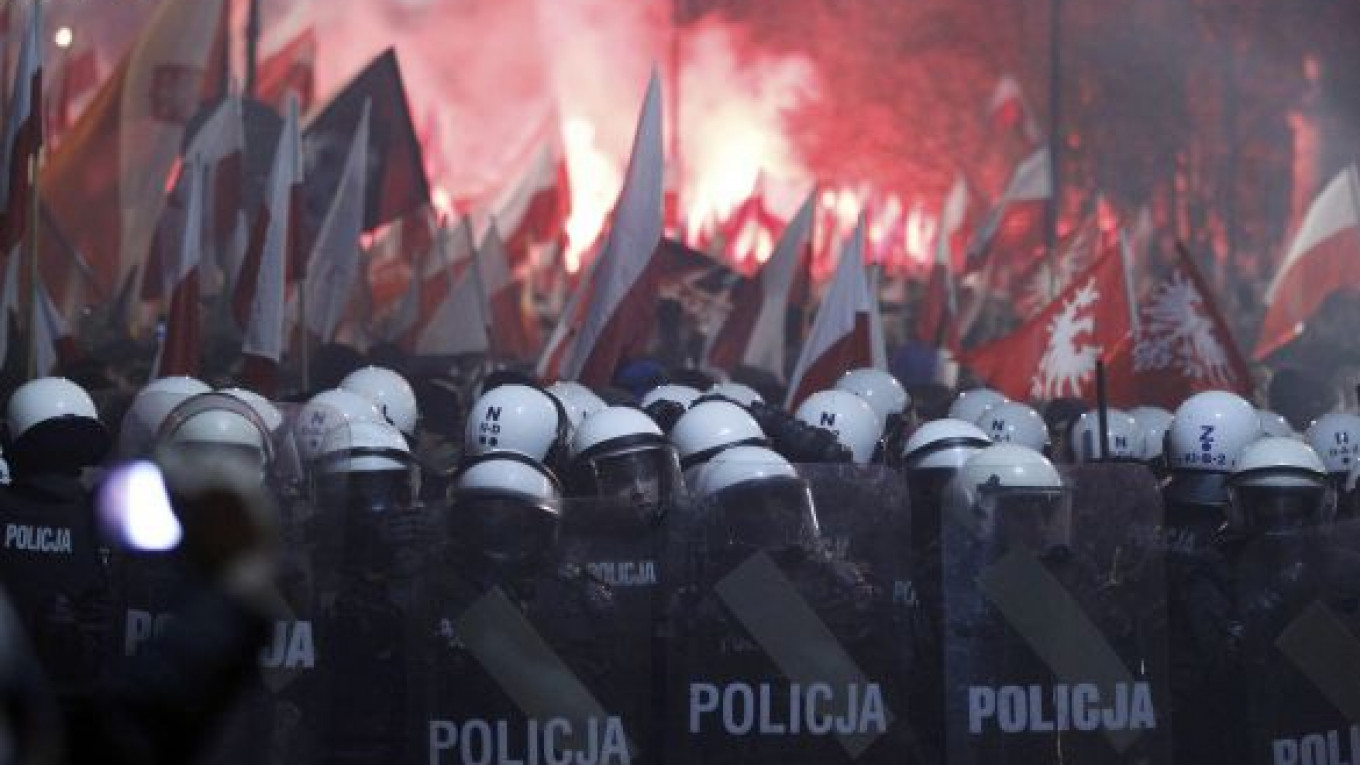Russia demanded an apology from Poland on Tuesday after far-right rioters threw firecrackers at the Russian embassy in Warsaw, reviving tension between countries that have long been at odds.
The Polish ambassador in Moscow was summoned to the Russian Foreign Ministry and told that Russia wanted an official apology and compensation for damage done to the embassy in Monday's violence, which followed a nationalist march.
Russia also asked Poland to take steps to punish those responsible, protect Russian diplomatic buildings and "prevent a repeat of such provocations in the future," the ministry said.
A Polish Foreign Ministry statement had expressed deep regret about the incident and said such behavior deserved "strong condemnation."
Polish police used rubber bullets to break up groups of masked far-right youths when the nationalist march turned violent. The Russian ministry statement said "passivity and belated action by the police" were largely to blame.
The main target of the rioters appeared to have been any symbol of left-wing, liberal views, but for some Poles the Russian embassy is a symbol of repression during decades of Soviet domination after World War II.
Russian media said that in addition to firecrackers, rioters threw bottles, stones and trash at the embassy and set fire to a police booth nearby.
Some Russian officials saw the violence in the context of strains between Russia and the European Union over human rights and democracy as Ukraine prepares to sign a trade pact with Brussels that would mark a symbolic move away from Moscow's orbit.
One suggested that the unrest showed the problem of nationalist violence is more serious in the EU than in Russia, where anti-migrant rioting rocked Moscow last month.
"The events in Warsaw show: Nationalism is immeasurably stronger in several EU countries than it is in Russia," Alexei Pushkov, the head of the State Duma's International Affairs Committee, said on Twitter. "The EU should not lecture us but deal with its own members."
Mikhail Margelov, the head of the equivalent committee in the Federation Council, said the violence had "turned Poland from an influential member of the EU into … a third world country," Interfax reported.
Poland has been a strong supporter of closer EU integration with neighboring Ukraine before a summit in Lithuania from Nov. 28 to 29, at which Kiev could sign an association agreement and develop trade ties with Brussels.
Bitterness over the past mars ties between Moscow and Warsaw despite the collapse of communist rule in eastern Europe and the fall of the Soviet Union more than two decades ago.
Moscow and Warsaw traded blame last year after Russian and Polish soccer fans clashed on the night of a Euro 2012 match in the Polish capital. Bitterness also lingers over the murder of thousands of Polish prisoners of war in 1940 in Katyn, near the Soviet city of Smolensk.
Mutual recriminations also followed the crash in April 2010 of a plane carrying the Polish president and 95 others to an event in Russia commemorating the Katyn massacre, killing everyone on board.
A Message from The Moscow Times:
Dear readers,
We are facing unprecedented challenges. Russia's Prosecutor General's Office has designated The Moscow Times as an "undesirable" organization, criminalizing our work and putting our staff at risk of prosecution. This follows our earlier unjust labeling as a "foreign agent."
These actions are direct attempts to silence independent journalism in Russia. The authorities claim our work "discredits the decisions of the Russian leadership." We see things differently: we strive to provide accurate, unbiased reporting on Russia.
We, the journalists of The Moscow Times, refuse to be silenced. But to continue our work, we need your help.
Your support, no matter how small, makes a world of difference. If you can, please support us monthly starting from just $2. It's quick to set up, and every contribution makes a significant impact.
By supporting The Moscow Times, you're defending open, independent journalism in the face of repression. Thank you for standing with us.
Remind me later.






